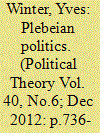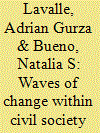|
|
|
Sort Order |
|
|
|
Items / Page
|
|
|
|
|
|
|
| Srl | Item |
| 1 |
ID:
115735


|
|
|
|
|
| Publication |
2012.
|
| Summary/Abstract |
In his Florentine Histories, Machiavelli offers an ambivalent portrayal of the revolt of the textile workers in late fourteenth-century Florence, known as the tumult of the Ciompi. On the face of it, Machiavelli's depiction of the insurgent workers is not exactly flattering. Yet this picture is undermined by a firebrand speech, which Machiavelli invents and attributes to an unnamed leader of the plebeian revolt. I interpret this speech as a radical and egalitarian vector of thought opened up by Machiavelli's text. The revolutionary address reveals an untimely and not entirely self-conscious political radicalism, a plebeian politics that repudiates the logic of oligarchic privilege and is simultaneously not available for subsumption under the mantle of civic republicanism.
|
|
|
|
|
|
|
|
|
|
|
|
|
|
|
|
| 2 |
ID:
107993


|
|
|
|
|
| Publication |
2011.
|
| Summary/Abstract |
For the past half a century, Latin American scholars have been pointing toward the emergence of new social actors as agents of social and political democratization. The first wave of actors was characterized by the emergence of novel agents-mainly, new popular movements-of social transformation. At first, the second wave, epitomized by nongovernmental organizations (NGOs), was celebrated as the upsurge of a new civil society, but later on, it was the target of harsh criticism. The literature often portrays this development in Latin American civil society as a displacement trend of actors of the first wave by the second wave-"NGOization"-and even denounces new civil society as rootless, depoliticized, and functional to retrenchment. Thus, supposedly, NGOization encumbers social change. The authors argue that NGOization diagnosis is a flawed depiction of change within civil society. Rather than NGOization related to the depoliticization and neoliberalization of civil society, in Mexico City and São Paulo, there has been modernization of organizational ecologies, changes in the functional status of civil society, and interestingly, specialization aimed at shaping public agenda. The authors argue that such specialization, instead of encumbering social change, brings about different repertoires of strategies and skills purposively developed for influencing policy and politics. Their argument relies on comparative systematic evidence. Through network analysis, they examine the organizational ecology of civil society in Mexico City and São Paulo.
|
|
|
|
|
|
|
|
|
|
|
|
|
|
|
|
|
|
|
|
|